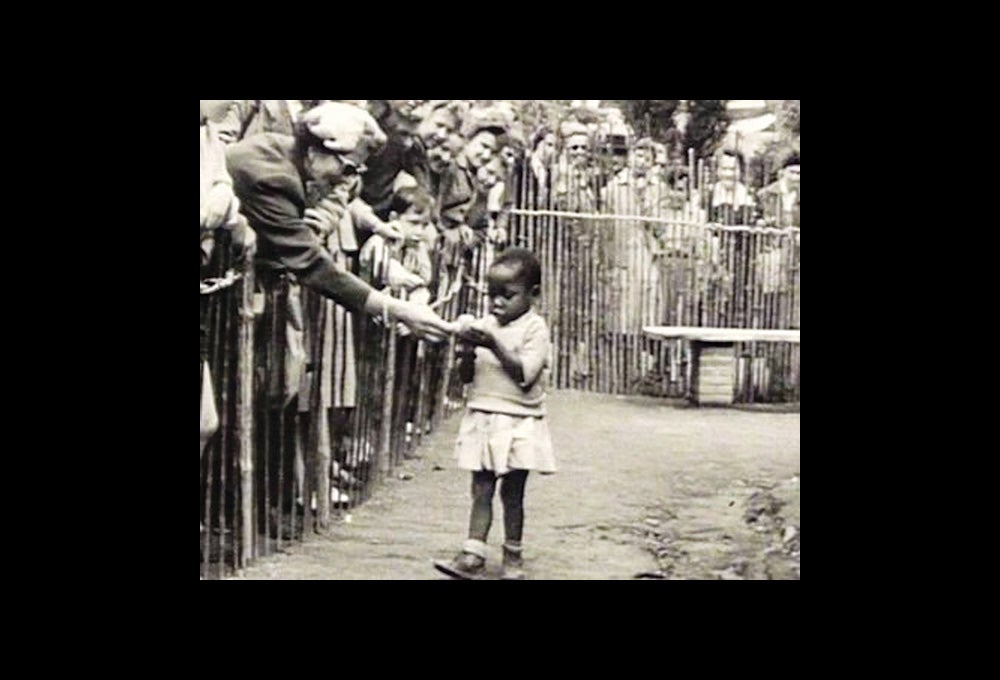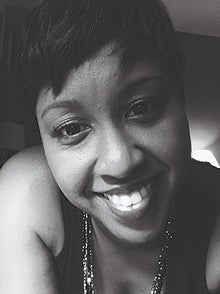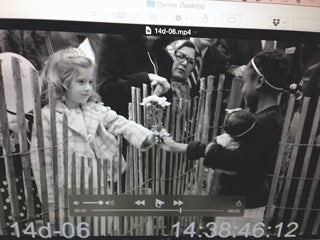Human Zoo

A dark, forgotten chapter of the 1958 World’s Fair compelled filmmaker Monda Raquel Webb ’90 to explore racism and the loss of childhood innocence.
By Nicole Maranhas
1958: A young girl twirls in front of her bedroom mirror, picking out a party dress for her birthday trip to the World’s Fair in Brussels, Belgium. Cut to fairgrounds: popcorn tumbles from a kettle, a ticket booth opens. In a small dirt corral, a groundskeeper sweeps leaves from the dirt of one of the day’s exhibitions, a replica of a Congolese hut. Inside the hut, an African girl waits with her mother. The groundskeeper stakes a sign into the dirt: live feeding.

Thus begins the short film Zoo (Volkerschau) by first-time filmmaker Monda Raquel Webb ’90, inspired by a real-life photograph of an African child on display in the “Negro Village” at Expo ’58, the first World’s Fair following the end of World War II. “I knew the story needed to be told,” says Webb. After seeing the black-and-white photograph posted on the internet, she was shaken by the realization that human zoos—ethnographic displays of Eskimos, Native Americans, Asians, Africans, or other “human curiosities,” especially popular in the 18th and 19th centuries—had existed. More disturbing was how recently the photograph had been taken: 1958, only ten years before Webb was born. “I had trouble processing it,” Webb says. “I instantly needed to know this little girl’s story, how it would feel to lose your innocence in that way. I heard a definitive voice, not even mine: You’re going to make a film. Even though I had no idea how I was going to do it.”
As a URI undergraduate, Webb was a basketball player and track star on a full athletic scholarship. She majored in journalism and minored in English, and was a founding mother of the University’s first African American sorority, Alpha Kappa Alpha. Although she loved the arts, she felt obligated after graduation to pursue a practical path. She returned to her native Maryland, working in IT and eventually real estate and the mortgage finance industry. But her heart belonged elsewhere. “The first 44 years, I worked to make sure my mother would be proud of me,” says Webb. “I decided the next 44 years are for me.”
Webb had never written a screenplay, but she drew on her writing background to navigate her way to a finished script, centering her story on two young girls: a well-pampered German girl on a birthday trip to the World’s Fair and the African child who is put on display. Shot in black and white to a haunting violin soundtrack, the film follows the girls in the hours before they meet.

Since it premiered last year, the film has screened at festivals around the world, earning audience accolades and numerous awards, including the prize for Best Script at the Filmmakers International Film Festival in Marbella, Spain, last fall. “People said it would be impossible to get the film made and into festivals,” says Webb, reflecting on the challenge of recreating a World’s Fair and 1950s Europe in her backyard, on a shoestring budget with a handful of cast and crew. “I couldn’t allow myself to get caught up in that fear. We each have our own path; one person’s journey does not need to be my journey.”
This is the philosophy that also inspires her work. Through her production company, Little Known Stories, Webb hopes to shed light on other stories that history has overlooked or ignored. “If we lose our history, we lose ourselves,” says Webb. She dedicates Zoo to the unknown girl in the photograph; to Saartjie “Sarah” Baartman, the Khoisan woman stage-named the “Hottentot Venus” as a 19-century London and Parisian “freak show” attraction; and to Ota Benga, an African pygmy who lived in captivity at the Bronx Zoo in 1906, eventually committing suicide at 32 years old. “To the extent that we don’t learn the history of the world, we are bound to repeat its mistakes,” she says. She hopes Zoo, and stories like it, can be an educational tool in classrooms for students to understand the roots of racism. “I’m convinced we don’t come into the world with cruelty and bad intentions stamped on our hearts,” says Webb. “I believe children are born with love, light, and hope.”
In the final minutes of Zoo, the show begins. The birthday girl peers over the fence, startled as the African girl her own age steps out from the hut. The birthday girl is confused as the crowd points and whispers. “Mama, why is that little girl inside the fence? Will she perform acrobatics?” the birthday girl wonders aloud. “That must be what we’re waiting for.” •
〉 For more information about Webb’s work, visit humanzoos.com.
 Home
Home Browse
Browse Close
Close Events
Events Maps
Maps Email
Email Brightspace
Brightspace eCampus
eCampus


